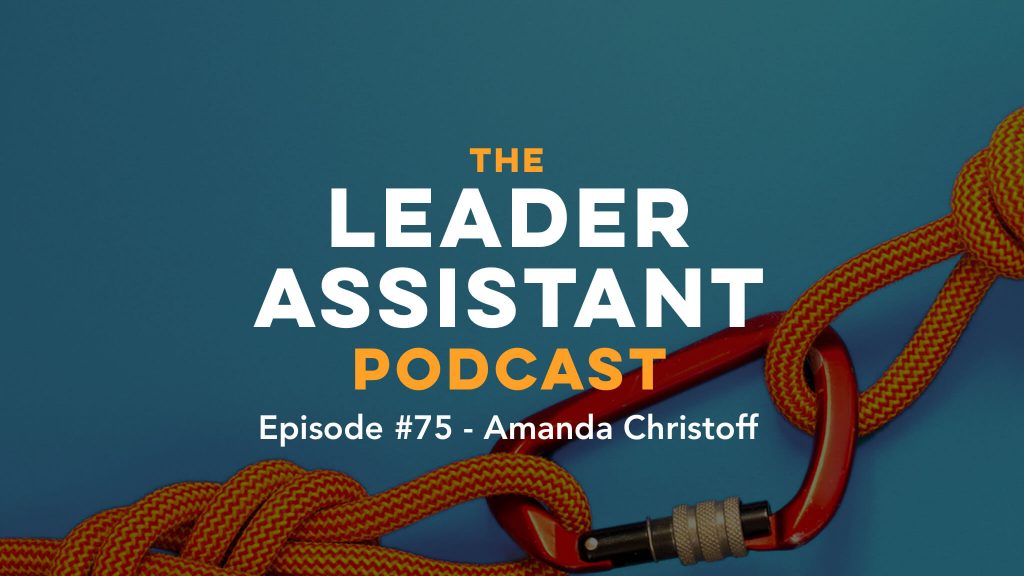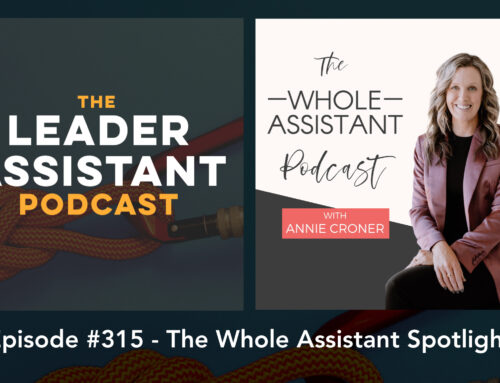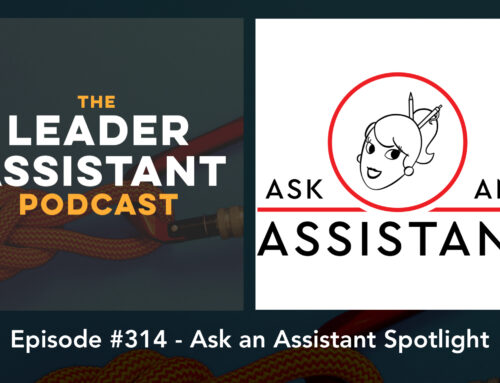Amanda Christoff is the CEO & Founder of Bloom Talent, a woman-owned boutique recruiting firm that specializes in Chief of Staff, Executive Assistant, and Startup Ops roles.

Amanda has great insight on resume crafting (and the biggest mistake you can make when crafting yours), interview prep, job searching, negotiating a higher compensation package during the interview process, and how to resist burnout. Enjoy!
LEADER ASSISTANT LIVE TRAINING EVENTS
Check out the schedule for upcoming Leader Assistant Live events at leaderassistantlive.com/events.
LEADERSHIP QUOTE
I’ve learned that people will forget what you said, people will forget what you did, but people will never forget how you made them feel.
– Maya Angelou
CONNECT WITH AMANDA
ABOUT AMANDA
Amanda Christoff is the CEO & Founder of Bloom Talent, a woman-owned boutique recruiting firm that specializes in Chief of Staff, EA & Startup Ops roles. Bloom Talent prioritizes delivering a white glove service to our clients & candidates over anything else. In her personal time, Amanda and her husband are usually chasing around their toddler in San Francisco.
THE LEADER ASSISTANT BOOK
Download the first 3 chapters of The Leader Assistant: Four Pillars of Game-Changing Assistant for FREE here or buy on Amazon here.
JOIN THE COMMUNITY
Join the Leader Assistant Slack Community here, or the Facebook Group here for bonus content and to network with other assistants who are committed to becoming leaders!
SUBSCRIBE
Subscribe to The Leader Assistant Podcast so you don’t miss new episodes!
You can find the show on Apple Podcasts, Spotify, Google Podcasts, Pandora, and Stitcher.
Join my email list here if you want to get an email when a new episode goes live.
LEAVE A REVIEW
If you’re enjoying the podcast, please take 2 minutes to rate and review the show on Apple Podcasts here. Each review helps me stay motivated to keep the show going!
—
EPISODE TRANSCRIPT
Amanda Christoff 0:00
Hi, I’m Amanda Christoff. Today’s leadership quote comes from Maya Angelou. I’ve learned that people will forget what you said. People will forget what you did. But people will never forget how you made them feel.
Podcast Intro 0:16
The Leader Assistant Podcast exists to encourage and challenge assistants to become confident, Game Changing leader assistant.
Jeremy Burrows 0:28
Thank you for listening to The Leader Assistant Podcast. Welcome to Episode 75. Hey friends, thanks for tuning in. If you’re looking for affordable professional development training specifically for you, and executive assistant, Administrative Professional virtual assistant, check out our live events at leaderassistantlive.com. I will share a link in the show notes as well at leaderassistant.com/75. But just wanted to encourage you to check out our upcoming schedule of events at leaderassistantlive.com. Enjoy this interview. Hey, everyone. Thanks for tuning in to The Leader Assistant Podcast. It’s your host Jeremy Burrows. And today I’m excited to be speaking with Amanda Christoff. Amanda is the CEO and founder of bloom talent. Amanda, how’s it going?
Amanda Christoff 1:21
It’s going good. Nice to talk to you, Jeremy. And thanks for having me on the show.
Jeremy Burrows 1:26
Yeah, so what part of the world are you in today?
Amanda Christoff 1:29
I am in San Francisco, California. In a neighborhood called Cole Valley actually today.
Jeremy Burrows 1:37
So let’s talk about your first job. What was your first job? And what skills did you learn in that role that maybe you still use today running a recruiting firm?
Amanda Christoff 1:48
Yeah, so when I graduated college, I was really drawn to the nonprofit space because I really wanted to help people. And I just felt called to that. And so I actually worked with a breast cancer organization that put on fundraising walks to raise money for breast cancer. And in that job, it was actually very similar to recruiting and that I was recruiting people to do the event and then helping them along the way with their fundraising. So it was a lot of, you know, communicating and, and helping people throughout their process, which was about six months. And you know, getting them to the finish line and kind of being that support person along the way. And so it was actually very complimentary to what I do today, in recruiting,
Jeremy Burrows 2:38
where do you go from there? And why did you decide to start your own firm?
Amanda Christoff 2:41
Yeah, so one of my colleagues at the breast cancer organization, you know, had a friend in recruiting and thought that we would be really good partners. And so I didn’t know that much actually about recruiting and met with her and learned a lot and realized, wow, this is definitely something I’m excited about. I’ve always been a people person. And I’ve always enjoyed helping people. And it just sort of seemed like the perfect fit on both of those realms. And so I joined an agency and was sort of brought in as a coordinator to help her and she was really my mentor and got me going. And within, I think six months I was promoted into recruiting, and was there for, you know, just a little under five years before I realized, like, I really want to do this on my own terms and create my own agency, and hire my own people and really do it the way I like to do. And it was a really great foundation to work for this other agency, because it really helped me learn so much about the business. But I’ve always had an entrepreneurial spirit and really wanted to try it on my own. And here we are five years later, still going very strong at Blue talent.
Jeremy Burrows 3:57
Awesome. So why did you choose to specifically focus on Chiefs of Staff and executive assistants?
Amanda Christoff 4:06
Yeah, so the when I started recruiting, this was actually the team that I worked on. And I quickly realized that it was the perfect space for me to recruit because it’s it’s really relationship recruiting, where you’re really connecting with people and understanding, you know, because executive assistant and chief of staff ‘s are naturally drawn to wanting to help people as well. And a lot of what makes a successful hire is a personality match along with the skill match. And I really enjoy that part of recruiting which is learning about somebody and really getting to know them on a personal level and then helping them get matched with the right person. And so I quickly realized like, this was the space for me, and, you know, it wasn’t just a transactional sort of style of recruiting. It was very much relationship based.
Jeremy Burrows 4:58
Yeah, it’s a very unique Um, relationship, as you said, with the with EAS and their executives and so yeah, you definitely have to know the person a little more than just their, their resume.
Amanda Christoff 5:10
Yes. And a lot of it is built on trust and loyalty, and it takes years to kind of build that relationship. And that’s just been always and I also really believe that executive assistants really helped run companies and make things happen, there’s so invaluable to the organization that like, you know, I just feel lucky that I get to help them find great roles, and also help companies find people that help, you know, executives take it to the next level, because they have someone they can trust that’s going to help them get there.
Jeremy Burrows 5:43
So can you tell us a story of a time when you placed someone and it didn’t work out?
Amanda Christoff 5:50
Yeah, I mean, to be honest, luckily, a blue talent, that doesn’t happen very often, because we spend so much time on the forefront, you know, really trying to get to know the person. But I think when when that can happen is when one, somebody reveals themselves differently in an interview than they do in the job. And you realize, when you get into the job that while this is just not a match. And it can kind of work on both sides, you know, maybe the executive system didn’t present themselves in the most transparent way. And or the executive, or, you know, things change, I think, when I’ve seen it happen before is when we place an EA in a role, and they’re super excited to support the CFO. And then unfortunately, the CEO leaves after a month due to personal reasons, and they’re redirected to somebody else in the company. And that personality match just doesn’t fit. And that’s not why they joined the role and the company, they joined to support this one person. And so that’s typically how when things don’t work out as what I see. And then of course, there’s other situations that can happen. But I would say commonly, that’s what happens.
Jeremy Burrows 7:09
So on the assistant side, what’s one of the biggest mistakes an assistant can make when they are crafting their resume?
Amanda Christoff 7:19
To be honest, I can’t believe how many resumes I still see with errors. So if you’re an executive assistant, someone’s hiring you to be another set of eyes and to be there detail oriented because a lot of times an executive is moving through the day very quickly, right. And they need this person to, to dot their i’s and cross their T’s. And so if your resume has like one of my biggest pet peeves is when people’s dates are not formatted correctly, meaning like one is way on the left one is kind of in the middle of the page one is on the far right, or they’re not quite all lined up. And to me, that’s just a red flag. I mean, if you’re trying to interview, you know, and put your best foot forward, you would want to show that you’re a detail oriented person, and that you care about delivering, you know, product that you’ve really spent time on. So, you know, it doesn’t have to be, you know, I always say to that, make sure that when you’re sending a resume one day sign up that there’s no errors that punctuation like not, you know, some people have like periods in one job, and then periods, not in the next, you know, so just being very mindful of that. But also, being mindful that short, very short answers kind of don’t show that you have a full understanding of the job. So having a little meat in the resume without being too wordy, is also important, because people want to see that you were able to sort of articulate well, all of the things that you’ve done in the job. And doing that so much so that it shows that you had like a meaty role. And I think the way you write your resume shows that.
Jeremy Burrows 9:04
So what’s another tip, just in general, for assistants or chief of staff there are looking for a new job.
Amanda Christoff 9:15
Well, I think first and foremost, if you especially if you’ve done the EA role, you know, once or twice already, or you’re very senior, I think first and foremost really owning like what kind of assistant are you and what kind of personality type do you like to support and sitting with yourself and asking that, like, I prefer I prefer to be incredibly prescriptive, prescriptive, meaning like I like I like driving, I like making the decisions. I like giving the advice or I prefer somebody that drives and I just kind of make the To Do lists and I follow up with them and I’m like their person, you know, and so really knowing your personality type because when you know that Uh, and you know your style. And also, you know what kind of organization you like to work in? Do you like to work with a team of EAs? Do you like to be the sole EA? Do you like to support multiple people? Or do you like to have one person that you support? Those are really important factors when you’re thinking about getting a job. So thinking through that, and then when you come to me being very clear about that, so then it makes it super easy for me to say, perfect, I have three jobs that are perfect for you. This is why the personality fit the company size, the type of role. But if you come to an interview, and you say, I’m open, you know, that’s great. But oftentimes, when you really dial down, like what you actually enjoy in the job, there are specifics that you and preferences that you have. So I think it’s good to think about that before you dive into a job search.
Jeremy Burrows 10:52
Yeah, that’s great, great advice. It’s nice to know, yourself and know your own preferences and know, what you work well, are the type of people you work well with, and the people you don’t work well with.
Amanda Christoff 11:06
It’s, it’s so important, because like, for instance, thing that we see a lot in San Francisco is you’re starting to see a lot of CEOs that are engineering, previous engineers, you know, and they have often, you know, not to categorize them on the same bucket. But I do notice a pattern in like a, you know, a CEO, that’s more engineering focus, versus perhaps sales focused, and, you know, their their working styles, and even the way that they like, the interview style to go and the way people respond to questions. is different. So it’s helpful to even know that like, do I Is there a type of profile within an organization that I get along with, there’s some EAS that come to me, and they say, I love supporting, you know, more engineering, analytical type of people. Others say I like to support more of like a business sales type of personality. And so, and being able to ask yourself that question like, why, what is it about that style of leadership attracts you? How do you interact with that style of leadership? That’s gonna help you find such a great job, the more you dive into that.
Jeremy Burrows 12:21
So what types of questions do you like to ask when you’re interviewing assistants or that you’ve heard or seen other executives ask in interviews?
Amanda Christoff 12:32
Well, one of the things that comes up for me a lot, and a lot, because I tend to work with a lot of startups. And one of the biggest things that comes up for me when I’m talking to CEOs about what kind of year they want, they really want EAS that take ownership, they have a lot of things on their plate, they’re trying to raise another round of funding. They’re building a team. So having an EA that can take ownership of their role, their responsibilities and come in with like, a framework of how they they support the executive is really crucial. And so what I like to do is I always ask open ended questions, because I like the person to sort of guide the conversation versus me just asking yes, or no questions, because I don’t get a lot from that. But I find if I asked an open ended question, if somebody gives me a vague response, I will continue that will tell me more about that. What do you mean by that? Can you give me an example? And I really appreciate people that can give very specific examples. And that’s something that’s been coming up a lot in our interviews on why clients have been passing on candidates, is they want specific answers around well, how do you organize a calendar? How do you How would you let me know if something was urgent and needed my attention? Or, you know, how would you go about responding to this, the more specific people are, the more that builds that trust and familiarity. And so, when I’m interviewing people, I’m really trying to that for that up front, so that I can and if people aren’t very specific, that’s actually feedback I give to people. Because it’s not going to help if they’re vague in interviews.
Jeremy Burrows 14:18
I always have a hard time like, thinking I haven’t had to do many interviews. Thankfully, I’ve had good luck getting the with executives that I’m in but like, I’ve always thought well, you know, I’ve I know that I know what to do. But describing in explaining what you do to somebody else’s is not an easy task. Oh,
Amanda Christoff 14:40
well, and sometimes like you’re the EAA, you’re the expert, right, like so a lot of times these executives are like, you walk me through how you do your job because you’re the expert, and you know, and I kind of want you to take care of me or show me lead for me. So the more specific you are, the more they’re like, Great this person knows exactly what they’re doing. I can already envision how they work. I trust that, you know, let’s move forward. And it really speeds up the interview process, actually.
Jeremy Burrows 15:08
So let’s talk a little bit about compensation. And the first first question I want to ask is, why do you think executives and companies and HR departments struggle to pay assistants more?
Amanda Christoff 15:25
Well, I think that there’s, there’s, I’m seeing a shift, and San Francisco, at least, which is really positive, that assistants are getting paid more. But I think that there’s a lack of information or a lack of just awareness around everything that an EA does, because an EA a lot of times is working behind the scenes. And sometimes they’re on their own islands, you know, they’re not working on a team. So they don’t have people advocating for them, other than their executive, who, again, like part of their job is to basically look like everything is smooth, sailing, and easy. But really, we all know, behind the scenes that they’re running around, you know, having to do all of this stuff to make their executives life, you know, run seamlessly throughout the day. So, I think, you know, there’s sometimes a lack of knowledge. And I think, also, you know, I’m starting to see this more and more, which is great that there’s, like, you know, even like what you’re doing with sort of advocating and creating awareness around No, no, when you’re in the negotiation phase, in an offer, you know, sell yourself like, so, you know, so your value add, and I think I, you know, I think sometimes what I see is EAS don’t push back in a negotiation, and or like upfront, they want to seem flexible. And, you know, not like they’re not asking for too much. So in the beginning, maybe they’re not setting themselves up. And that’s where I think more educating more education to companies and clients is helpful to know what the markets paying what, why this person is asking for the salary, it’s because of XY and Z, a lot of times, there’s really not a boundary around, like, these are the hours that they’re working, and they’re kind of always on. And that’s, that comes at a cost. And I think what I find is, if a client really pushes back on salary, you know, they don’t really have a full understanding of of the role. And that’s where you have to really go in, but I’ve been lucky, and most of my clients, you know, they’ll give a ballpark of like, this is the max, I can pay, which is helpful for me to know, but a lot of them are, are very open to being educated and on because they want to be fair, and they want this person to feel good starting in the role. So I think it’s because also, the role has changed a lot. It’s gone from being less transactional, and a lot more strategic and really being a right hand. And so there’s a, there’s that shift, and with that shift where education needs to happen in order for them to really understand how much they need to pay for this role.
Jeremy Burrows 18:13
Yeah, so what are maybe one or two specific examples or tips, or tricks that assistants can use to negotiate for a higher compensation package during that interview process?
Amanda Christoff 18:30
Well, you know, so one of the best tactics you can always use is when somebody feels as though they may lose you, you know, they, they want to, they want to come in at a number that’s going to sell you on the company. So I think it’s always healthy to let people know, hey, I’m actively interviewing. And this is what I’m, you know, this is what I’m interviewing for with a couple other companies. So the company’s kind of low balling you, you could always say, like, Thank you, I, you know, I appreciate that. But I’m actually interviewing with another company that’s looking to pay me x. So that’s really the range that I’m, I’m targeting. And therefore you don’t need to necessarily just say like, this is what I want, but instead it kind of it, it. It allows you to say this is what I’m targeting, and this is what actually other companies are, are offering, which then makes companies feel like wow, I don’t want to be the low baller and also, you know, while you’re interviewing other places, okay, well, I need to speed this up. Let’s make an offer that’s competitive. Competition really inspires, I think, a good offer. So that would be a tactic that I would use. Another too. If you get an offer that was less than you were hoping to make and or didn’t come in exactly around what you were looking for. You can always push back and I think, you know, a way that I always like to say is you know, I appreciate your offer and you I’m hoping there’s some wiggle room because when I’m crunching the numbers of what, you know, what my cost of living and expenses, like, I really need to make acts in order to make things work. And so I’m hoping you can meet me there. And I find that that’s also, you know, because a client doesn’t want to necessarily put a employee out and hurt their cost of living. And if they can’t meet you, then they can’t meet you. But it’s definitely an angle that I think also works.
Jeremy Burrows 20:31
So, let’s talk a little bit about you personally. And you’ve you’ve run your business for you say, five years, is that right? Yeah. Have you ever experienced burnout?
Amanda Christoff 20:49
So it’s funny, you asked me this. And I will say, Yes, I I’ve had like bouts of burnout before, but I would say the first time I really experienced burnout was last year. We went through some changes last year, you know, I had some life changes, I had a baby, I could not work at the piece that I was working before I had a child and and had to sort of change some things up. But then last year, I sort of took on a lot again, and myself as I was sort of peeking through the business. And I was running on a lot of, you know, adrenaline, which I enjoy. But there’s only a certain amount of adrenaline in your body before you reach a maximum capacity. And so that happened to me last year, it was just like, all of a sudden, you know, you’re just you’re getting enough sleep, you’re exercising, but you’re just so tired, you could barely like get through the day, and you could barely think clearly in your mind’s at a fog. And that’s when, you know, I kind of realized, okay, I need to, I need to rebalance my time. And my energy and I was noticing, like what was contributing to my burnout was, I was being too reactionary. Instead of carving out time for proactive, you know, brain thinking creative time. So I, one of the solutions I created around that was to come back to block scheduling where, you know, I can anticipate the energy I need to put into certain tasks, because I’m blocking out my schedule, versus just allowing my schedule to be reactionary meaning like jumping on calls with people jumping on calls with clients when they need me responding right away the emails, but instead kind of carving out more time. So it’s not in that reactionary function. And then also, I know a lot of people say this, but really what helped me a lot was getting back into my meditation practice, and kind of clearing my mind, of noise. And then getting back into a routine, where I was doing that every morning, really helped me to get back into my zone and like, get out of burnout.
Jeremy Burrows 23:07
You know, I burned out in my last gig and kind of took some time off in between jobs, and everyone experiences it. At some point, in my opinion, it’s just a matter of how extreme or how long or how, how hard you fall, basically. Yeah. So Yeah, appreciate you sharing your kind of tips. Those are those are good, good tips on coming out of it.
Amanda Christoff 23:31
Yeah, it’s, you know, a creeps up on you, you don’t realize it because you’re like flying high, and you’re just in work, and you’re just working, working, working, and then all of a sudden, it just kind of happens. And so I think it’s important that like, you know, I think in a in a very reactionary job. I mean, I think EAS are in the same boat, you know, very reactionary. You know, taking ownership of your own schedule. And creating blocks, I think is just super helpful, because I think that helps you reboot your energy. So you fill your bucket backup versus just completely depleting it. And so, I learned, I learned that very well last year.
Jeremy Burrows 24:15
So how can let’s shift back to assistants for a second, so how can assistants grow existing skills, develop new skills and really, ultimately own the role of being a strategic partner?
Amanda Christoff 24:31
Yeah, you know, that’s a great question. And I actually had an EA that I talked to recently that I think very highly of and she actually has sought out you know, there’s some great programs that are developing among, you know, fellow EAS a courses you can take groups where, you know, there’s like a course you can take and or a community you can be a part of where, let’s say you’re in different situations or you’re wanting to grow, and you’re not sure how to sort of ask for that promotion, there’s a lot of subgroups now offering support, specifically in the EAA space. So I know that she took a course with this organization called the Office ninjas and took a lot away from it, I guess they, you know, they had all different types of like tools and workshops to continue to grow in the career and takeaways, and you had to be invited to this. But she really spoke highly of that. And so I think, and then, you know, a couple of my other clients and candidates have created subgroups, like on Slack. And it’s kind of almost like a support group, where you can bounce ideas off of each other. And it’s, you know, it’s a smaller group that you have to be invited into. But I think they’re very inclusive, but you kind of have to be an EA to be in it. And I think that’s a great opportunity to share and understand what’s going on. And I think, you know, there are a lot of leadership, like, I think one of the things that EAS I’m hearing from yeas a lot is I want to take on more, I want to take on more ownership I want how do I get from strategic EA to chief of staff. And really, that jump is, you know, operational leadership and taking on ownership of more strategic projects. And so if you’re finding, like, I need more education on that space, oftentimes CEOs will say go to elite Go, go do a leadership education day or take a course and will pay for it because they want to enhance your, if it’s gonna make you stronger in your job, they’ll support that. And so I would encourage EAS to continually look out for those courses and to take them and ask your boss to pay for them. Because it’s only going to make you better at your job.
Jeremy Burrows 26:57
Totally agree. Definitely, definitely have your executive pay for it.
Amanda Christoff 27:02
Yes, yes. You do not need to pay for it, your executive. I mean, I will the cool thing about least in Silicon Valley, a lot of a lot of offers now pay, they have a stipend in the offer for educational funds, like they’ll pay for you to go out and do learning and development. And that’s part of the offer. So
Jeremy Burrows 27:25
awesome. So if you could snap your fingers and instantly give all assistance more of something, what would it be?
Amanda Christoff 27:36
I would give them more education on tools. I think we’re in a rapidly growing technology space where there’s like so many amazing hack tools on time management, email hacking, like, let’s not reinvent the wheel, let’s not do things manually. Like if there are tools out there that are fairly reasonable, like let’s get you on boarded on these tools, I think there’s just not enough time in the day to learn the tools or even figure out what are the tools. So if there were, if there was like a group of people that created hacks specifically for EAS, I would love to snap my fingers and just offer that to people because I think that would give them a lot more bandwidth and also potentially help reduce burnout.
Jeremy Burrows 28:32
Great. So Amanda, thanks so much for taking time out of your day to share your tips and wisdom and story. From recruiters perspective. I love hearing all different types of perspectives on the show. So really appreciate you and and the time you’ve given. So where can we find you online? And how can we support what you’re up to?
Amanda Christoff 28:54
Yeah, thank you so much, Jeremy for having me. I feel lucky to be here. So you can find us online. Our website is bloomtalent.io We’re also on Instagram at bloom talent SF. So on Facebook, and, you know, in terms of support, you know, we’re always looking to connect with fabulous executive assistants, chief of staff assistants, anyone in this space, and can always email us at Hi@bloomtalent.io. And we are always happy to meet new people. And if we can help you in your job search, I think one of the areas that you know, we’re locally based in San Francisco, but I know my goal for the next, you know coming years is to really try and bring in more remote opportunities. I think there’s so many amazing EAS that could do this from home. And so you know as as I’m building this this network of remote folks love to connect with anyone in the United States. And feel free to check out our website, we do have resources on there and you can always check out our jobs.
Jeremy Burrows 30:04
Perfect. Well, I’ll put those on the show notes so people can get to you more easily. And yeah, thanks so much again. Good luck to you. And hopefully we can meet in person someday in sunny San Francisco.
Amanda Christoff 30:18
Yes. And I just would say if there’s any listeners that are based in San Francisco, you know, that’s the majority of our jobs right now. So feel free to always reach out to us but thank you and we’d love to meet you Jeremy. The next time you’re out here in San Francisco.
Jeremy Burrows 30:34
Thanks again, Amanda. Great tips on interviewing resumes and negotiation and avoiding burnout. You can check out the show notes at leaderassistant.com/75 to reach out to bloom talent and Amanda and we will talk to you next time.
Unknown Speaker 31:04
Please live you on Apple podcasts. Goburrows.com






